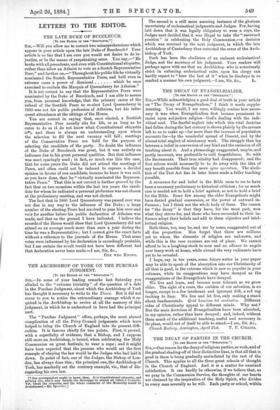THE DECAY OF EVANGELICALISM.
[To THY EDITOR OF THE " SPROTATOR."] Sia,—While acknowledging a good deal of truth in your article on "The Decay of Evangelicalism," I think it needs supple- menting. You would, I am sure, willingly confess how neces- sary it was when Evangelicalism first became prominent to insist upon subjective religion—God's dealing with the indi- vidual soul. The fearful neglect into which this vital doctrine had fallen during the last century is shown plainly by the arrears left to us to make up—far more than the increase of population accounts for—by the wonderful spread of Dissent, and by the almost total neglect of missionary work. The struggle then lay between a belief in conversion of any kind and the omission of all teaching about it. And a phraseology exaggerated, maybe, and partly incorrect, was preferable to cold forgetfulness. So with the Sacraments. Their true vitality had disappeared; and the first reform would necessarily be to do away with the idea of any benefit possible from the mere opus operaturn. The aboli- tion of the Test Act has in later times made a fuller teaching possible.
A reverence for and belief in the Bible seem to me to have been a necessary preliminary to historical criticism ; for as much care is needed not to hold a brief against, as not to hold a brief for the Bible. Some few among the older Evangelicals might have denied gradual conversion, or the power of outward in- fluences; but I think not the whole body of them. The reason for "the decay" is that they have, for the most part, won what they strove for, and those who have succeeded to their in- fluence adopt their beliefs and add to them objective and intel- lectual religion.
Both these, too, may be, and are by some, exaggerated out of all due proportion. Men forget that there are millions yet to whom the elements of religion are unknown, and while this is the case excesses are out of place. We cannot afford to be a laughing-stock to men and an offence to angels over fancy work at home, while abroad the very rudiments have yet to be revealed.
I hope, say in ten years, some future writer in your paper may be able to speak of the absorption into our Christianity of all that is good, in the extreme which is now so popular in your columns, while its exaggerations may have decayed as the exaggerations of the Evangelicals have decayed.
We live and learn, and become more tolerant as we grow older. The sight of a cross, the emblem of our salvation, is no longer, except to a few intolerant and ignorant folk, a red rag inciting to fury. We live and let live, only making a stand about fundamentals. Quot homines tot sentential. Different sides of Christianity appeal to different minds. Why not ? But the main doctrines of Evangelicalism have been absorbed, in my opinion, rather than have decayed ; and, indeed, without them much of the additional teaching, useful and necessary in its place, would not of itself be able to stand.—I am, Sir, &c., Church Rectory, Accrington, April 21st. T. F. COLLINS.


































 Previous page
Previous page